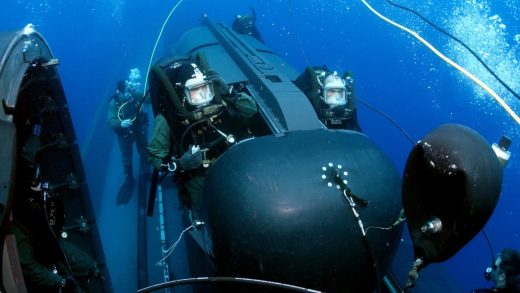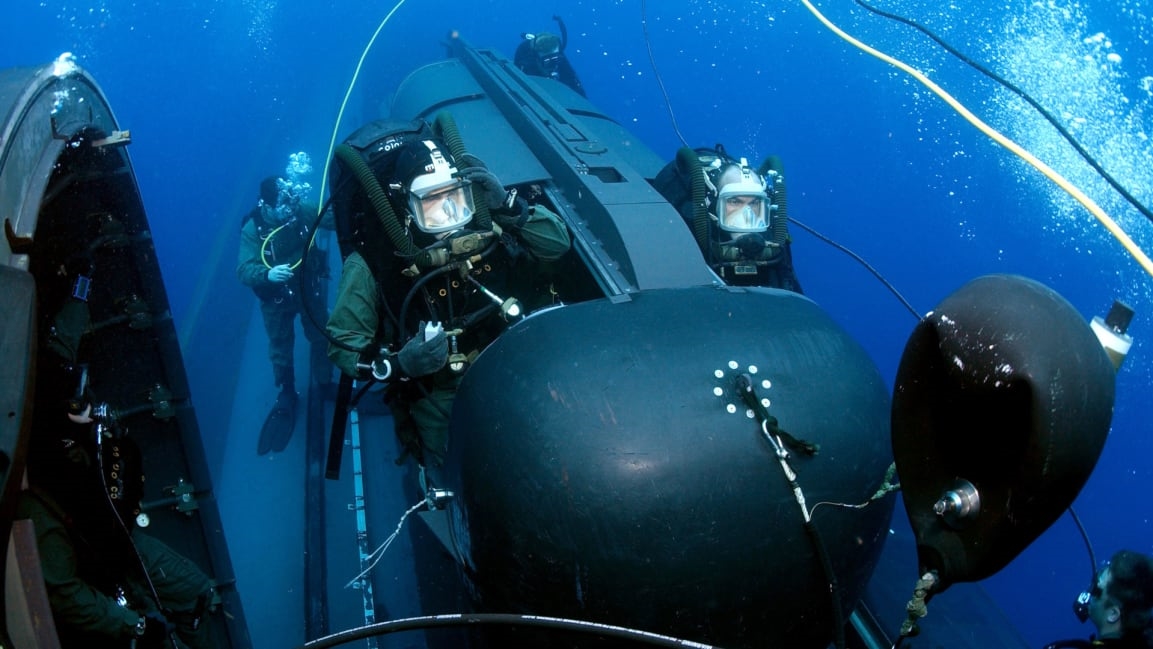A former Navy SEAL and a neuroscientist share 3 secrets for overcoming coronavirus stress
Crammed into the back of a mini-submarine with three other large SEALs, weapons, radios, and packs, you have little space to move, much less find comfort. It’s cold, wet, dark, and cramped. You’re never certain how long the trip will take. After an hour or so, seasickness sets in, and the only place to release is in the very mask you breathe from.
After two hours, cramping sets in, but with no room to stretch, you can only absorb the pain and wait for it to pass. After three hours, you start to think you might be going crazy as a glow stick dances around the darkness. After four or five hours, the submarine finally settles on the bottom of the seafloor, a few hundred yards off the coast, and it’s time to get out. The ride to the office is complete, and the real work begins.
In many ways, nothing has changed. The stress of raising nine-month-old twins, starting a company, and now dealing with the backdrop of the coronavirus pandemic, is every bit as uncomfortable as what I felt in the back of the SDV (submerged delivery vehicle). Stress on a worldwide scale without a particular end date in sight is unprecedented for those of us alive today. What happens next week, or the week after, or even two months from now is anyone’s guess. Navigating this challenge is going to require a special mindset.
Navy SEALs have this mindset, but they aren’t born with it. In fact, a largely unknown paradox of SEAL training is that often the biggest, fastest, and strongest candidates are the first to quit. Similarly, it is not physical prowess or natural ability that will get you through this challenge. Rather, it’s a set of principles, leveraged by SEALs and available to all, that will help you not only survive but thrive in the weeks and months, perhaps even years, ahead.
My circumstances have changed, but the principles I use to navigate them have not. None of us want to be in the situation we are in now, but we can all apply these principles to thrive.
They work.
These principles are not just military wisdom; they’re backed by contemporary neuroscience.
1. When you feel overwhelmed, move the finish line
Being overwhelmed is the consequence of trying to juggle too many mental operations at once, which makes it impossible to design or execute a good action plan. By reducing the set of operations, you relieve the load placed upon your frontal cortex (the region of your brain responsible for planning and action) and reduce the corresponding sense of panic. It isn’t about how much you do, but that you do something specific you are certain you can complete. The challenge that once seemed impossible becomes doable by engaging it piece by piece. The smaller the piece, the easier it is to accomplish and the faster your brain gets out of a state of overwhelm, restoring access to the brain circuits responsible for selecting and executing action plans generally.
This is what SEAL candidates do during “Hell Week,” when they are required to stay awake, cold and wet, for days on end. In its entirety, Hell Week is too much to process. However, those who shorten the week into manageable chunks of time find success. Sometimes this means just focusing on making it through the day, getting to the next meal, or even just lasting for five more minutes.
Focus on one thing you know you can accomplish in 10, or even 5, minutes rather than dwell on what you need to accomplish over the entire day. Even the potentially paralyzing situation of kids at home while you need to work, a spouse or parent who is experiencing anxiety, a loss of income, or any of the other difficulties that people are experiencing now, can be broken down. Whatever the case, attending to and crossing off one small challenge sets you up to define and take on the next.
2. When you feel powerless, take action
Powerlessness stems from a lack of perceived control. The molecule dopamine, famous for its role in our sense of pleasure, also enhances our energy levels and sense of possibility. Dopamine is released not just as a reward for a job well done, but also by positive anticipation of rewards and completion of goals. When you freeze, which is your default when you feel a loss of control in a given moment, it impedes dopamine release, which leads to an even greater sense of powerlessness. When you feel powerless, you must, instead, move forward. By taking action, you train your brain to repeatedly release dopamine, enhancing your energy levels and creating an outsized effect on your thinking, mood, and ultimate sense of what you can control.
When SEALs find themselves sensing a loss of control, they default to action, directing their attention toward something within their reach. It can be something little, such as triple-checking equipment before jumping from an aircraft at night or, as Admiral William McRaven (a former head of the Special Operations Command) recently recommended, when you’re stuck in the mud, start singing.
Reading the headlines is reason enough to feel powerless, let alone losing a job, being confined to a small apartment, having to work in what may be an unsafe environment, and the list right now goes on and on. To re-engage your internal reward system and regain your sense of possibility, take actions as simple as reading a book to your kids, making a cup of coffee, texting a friend, doing a load of laundry. Then look for the next action step. By doing so, you shift your mindset from one of powerlessness to one of resolve.
3. When you feel alone, support someone else
Feeling alone stems from the brain spending too much energy taking stock of our inner landscape. Supporting others rebalances the weight of attention we pay to our inner self to the outer world. It also activates hardwired, ancient brain circuits that release feel-good brain chemicals such as oxytocin and serotonin and prevents the release of chemicals that impair immunity and promote fear.
The more stressful the environment, the more SEALs focus on the needs of their team and teammates. Whether they’re cramming into a mini-submarine, carrying a telephone-pole-sized log, or dealing with the death of a teammate, they focus on meeting the needs of others to make the group more effective and reduce the perceived sense of stress any single teammate feels.
Between those who live alone and those who feel alone while social distancing is in effect, we face a time of extreme isolation. From a neurological perspective reaching out to someone in need, whether by phone, text, old-fashioned written mail, or even baking cookies and leaving them at a neighbor’s door, has the same effect as pulling up a flagging teammate. Helping others doesn’t just forge psychological bonds; it forges chemical ones as well. Those chemicals positively change our brain’s assessment of self and our place in the world.
The reality is that this situation is going to get harder before it gets easier. The principles you lean on now and in the period of time to come can make a tremendous difference in how you experience and emerge from all this. Know that you already have everything you need to be successful. In fact, you’re designed to handle moments such as this, no supplements or expensive gadgets required.
Our advice: Move the finish line, take action, and serve others. This is how you will come through this time a better, more resilient you and bring about a better, more resilient world in the process.
Andrew Huberman is a professor of neurobiology at Stanford University School of Medicine, and Pat Dossett is a former Navy SEAL and cofounder and CEO of Madefor.
(37)



